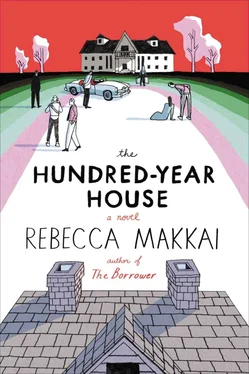She wouldn’t have recognized the man who sat folded on the curb, head in his hands, if it weren’t for the blue medical boot on his foot, the crutches stacked neatly at his side.
Doug turned in Melissa Calls the Shots just twelve days overdue, and after he’d finished some quick revisions for Frieda he received an actual two thousand dollar check in the mail, followed by the contract to complete two more books before the end of summer. One was another Melissa book, this time about her work backstage at the school play, and one was a Cece book. “I loved the detail about her poetry business!” Frieda said. “I think you’ll have a great ear for her.”
The whole week had been hot, but Doug made himself exercise anyway, circling the grounds and stretching. Behind the big house, he stopped to do the back releases Dr. Morsi taught him, then stepped on the fountain lip to stretch his hamstrings.
Miriam had been digging at the back of the fountain, and he nearly stepped in the hole. Apparently she’d been out here breaking old plates when she noticed a different shard, a red and white one, sticking out of the dirt. She’d pulled it out and dug around and found more — not just that one pattern but dozens of other colors of porcelain and glass and terra cotta. She’d excavated about two cubic feet back there. Her own archeological dig. “It’s like the house is giving me pieces,” she said. “Like they’re growing from the ground.” (“Or like someone had a really bad temper tantrum once,” Zee said. “And broke all the china in the house.”)
He’d remembered to bring bread crumbs, and he dropped them in the three koi ponds. How long did koi live? Eighty years? These ones were enormous and mottled and drowsy, and he liked to imagine Edwin Parfitt feeding them his leftover breakfast.
At the south end of the property, he toed helplessly at the foundations of the studios Gracie tore down in the seventies, when they were past repair — the long one that must have housed several artists, and the small one behind that. Both lay far enough back that the remains weren’t eyesores, and Gracie seemed content to wait for erosion and vegetation to swallow them. Even farther in the woods stood a granite statue of a squatting bear, about three feet high, moss covering its right flank. Doug sometimes rubbed its head for good luck. What else were statues for? The one surviving studio, on the other end of the property behind the vegetable gardens, had long ago been converted to a groundskeeper’s shed, but Zee remembered her father referring to it as the composer’s cottage — which was the only reason Doug hadn’t cut through the padlock and scoured the walls for Parfitt-era graffiti.
As he rounded the big house, he saw Sofia heaving paper grocery bags from the back of her van to the garage floor. The driveway was eerily empty: Gracie and Bruce off on separate golf dates, the Subaru with Zee in the city, Case’s BMW zapped by the Greek gods. Doug offered to help, but Sofia shook her head. Then she said, “This is ridiculous that Mr. Breen wants.”
There must have been twenty bags, from several different stores — Jewel, Dominick’s, Sunset, Don’s. He righted a Jewel bag that had fallen and saw it was full of blue cylinders of Morton’s table salt. So was the next bag over, and the next.
“He is for the end of the world,” Sofia said. “On the New Years.”
“He’s… stockpiling salt for the end of the world?”
“Is for take the water out of the food.”
“Wow.”
“Yes, is wow.”
Doug held up his hands as if to say, Hey, he’s your employer, not mine. Although Sofia probably saw them all as family, saw Doug as part of this entitled clan as much as anybody. And really, he was. Who was he kidding? Yet as he headed back to the coach house, he felt the urge to call over his shoulder that he’d gone to a crappy public school, that he never had a decent bike, that he was raised on off-brand TV dinners.
Up in the kitchen, he opened a beer and watched Sofia out the window. He could hear her grunting from all the way up here. No, that wasn’t right. She was too far, and it was coming from downstairs.
He went back down and found Miriam sobbing on the sunporch, her face folded into her arms on her card table. He tried hard to walk away.
“Hey,” he said, “hey.”
“I’m sorry, this is so embarrassing.” Miriam sat up, still sobbing, and wiped her face with the bottom of her T-shirt. He was surprised she didn’t leave makeup on it — he’d been told women from Texas wore makeup at all times. “This is so stupid.”
“I can leave,” he said.
“It’s — did you hear what happened?”
“Case’s car? Yeah, we all heard.”
“Oh. No, not that. John F. Kennedy Jr. He was flying his own plane last night, with his wife, and it crashed in the ocean.”
“They died?”
“This is the silliest thing to be crying about. I guess I was just a little bit in love with him. Like everybody else, right? I mean, I just always thought someday I’d at least get to meet him, and we’d have a really great conversation.”
Doug was thinking, on one level, about the Kennedys, about little John-John saluting his father’s coffin. On another, much louder level, he was realizing: Miriam is crazy. Miriam is absolutely bat-shit crazy.
He should have seen it before, in the bizarre, clashing mosaics covering the sunporch floor, in her cutting scraps from cracker boxes, her smashing empty wine bottles and saving grape stems. He looked closely now at the two big pieces on the floor. The one that was nearly finished centered around a blue sundress covered almost entirely by other, tiny things — paper, wood, broken plastic toys, beads, a clock hand, pen caps, dried flower petals, paper clips — so that they constituted another dress, a beautiful one, with swimming lines and arcs of light. But there was something insane about it, something that screamed “outsider art,” the kind of work made by someone who lived in a cabin and produced her best pieces when she went off her meds.
“You must think I’m crazy,” she said.
“No, no, not at all! It’s a sad event. That’s horrible, that whole family. There was the one who just died on the skis, right? And now this. And he was the best one.”
She sniffed wetly. He wanted to leave, but she’d be hurt. So he said, “Did you see what Bruce is making Sofia do?” and told her about the salt for the end of the world.
“Oh, he asked us to store the canned goods! Did you know that? He goes, ‘You have all that room on the ground floor, how about we fill you up?’ He’s worried about mice in the basement at the big house.”
“Mice that bite through cans?”
She smiled a little, which was a relief. “Apparently. I mean, I guess there’s pasta boxes and stuff. And their pantries are packed already, and he said the attic is full of old furniture and file cabinets Gracie won’t throw out.”
He laughed, trying to make her laugh. “What files could Gracie need? I’ve never seen that woman touch a piece of paper that wasn’t a note to the staff.”
“Maybe they’re from that arts camp. He said the furniture was. He said there were at least twenty mattresses up there, and headboards and dressers.”
“ Really .” He’d been leaning against the door frame, but now he sat on the floor among the heaps of cloth and shredded magazines.
The vague promise of some artifact of Edwin Parfitt’s had hit Doug in the solar plexus, and he felt like a man meeting his former lover on the street, someone he believed he’d forgotten but whose overwhelming effect indicated otherwise.
“Christ,” he said. “That old bitch! Listen, you know first of all it wasn’t an arts camp , it was a major arts colony. Okay, so, no, a minor one, but extremely important, at least in the twenties. I mean, you’re an artist: Charles Demuth? Grant Wood? There could be — think what could be up there!”
Читать дальше












